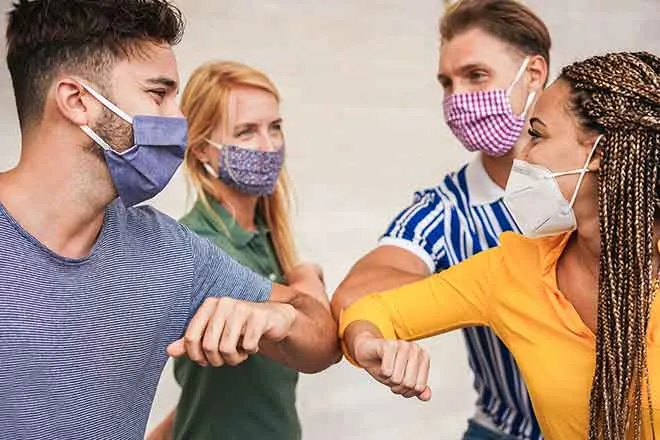
Daily Audio Newscast Afternoon Update - November 10, 2025
© INDU BACHKHETI - iStock-1336427297
News from around the nation.
Trump pardons Giuliani and others involved in effort to overturn 2020 election; more people living with mental health disorders could lose Medicaid; as shutdown continues, NV leaders call for state to backfill SNAP; Tribal WI school district clambers to fill gaps from delayed federal funds.
Transcript
The Public News Service Monday afternoon update.
I'm Mike Clifford.
President Trump has granted preemptive pardons to Rudolph Giuliani and others accused of trying to overturn the results of the 2020 presidential election, according to an official familiar with the matter.
That from the New York Times.
They report the official who requested anonymity because of the sensitivity of the issue said Monday that those pardoned include John Eastman, a lawyer who advised Trump's 2020 campaign, Sidney Powell, a conservative pundit, The Times notes the pardons cannot shield them from ongoing state-level prosecutions.
Meantime, beginning in 2027, many people covered by Medicaid will need to comply with new work reporting requirements in order to get or retain Medicaid coverage.
Experts say people living with mental health conditions are especially at risk of losing coverage.
According to the National Alliance on Mental Illness, 82,000 West Virginia adults have a serious mental illness, and the state ranks among the highest in the nation for rates of depression.
Deborah Steinberg with Legal Action Center says there are still reporting exemptions for people with disabling mental health disorders.
How can we get more people diagnosed?
One of the things would be to increase access to universal screening, making sure there are more opportunities for people to get screened for a mental health condition.
The new law requires people prove they are working 80 hours a month or participating and community engagement in order to maintain Medicaid coverage.
For West Virginia News Service, I'm Nadia Ramligan.
And as the shutdown continues, Silver State Democrat leaders are calling on Nevada to fund any gap in benefits for the 505,000 residents who depend upon the Supplemental Nutrition Assistance Program.
Republican Governor Joe Lombardo is reportedly considering calling a special session of the legislature this week to consider expanding a film tax credit.
Senate Majority Leader Nicole Canazaro says Democrats want to focus on setting up a state-funded food assistance program instead.
We are going to ensure that Nevadans receive their full equivalent of SNAP benefits for the month of November and we're going to ensure that we are setting aside additional funding in case Republicans in DC refuse to do their job and feed Nevadans.
Governor Joe Lombardo claimed in a statement that Nevada cannot legally backfill SNAP funds and offered to have the Nevada National Guard help at food banks.
I'm Suzanne Potter.
And a tribal school in northeast Wisconsin is speaking out about how the prolonged shutdown is impacting federal funding they heavily rely on for salaries, supplies, and student programming.
The Menominee Indian School District is one of about 20 in Wisconsin that receive impact aid funding.
Superintendent Marcus Denny says their district has limited access to local tax dollars due to a small taxable land base.
So that's the impacted our budget big time.
We've had to move around a lot of funds from our general fund.
We had to seek a line of credit with our bank. - Denny says the program funds cover about 40 percent of their budget, but payments have not got out because of the government shutdown.
This is Public News Service.
We head next to Maine where lawmakers say they'll introduce legislation to strengthen the state's landmark medical debt law as tens of thousands of residents could soon lose their health insurance.
The law prevents consumer credit agencies from including medical debt on their reports, but does not prevent debt collectors from getting a lien placed on a person's home or by garnishing their wages.
Democratic State Senator Donna Bailey says no one should have to live with that kind of fear.
People don't choose to get cancer.
People don't choose to get a heart attack.
It's not really a good gauge of someone's creditworthiness.
Consumer advocates say medical bills are often inaccurate and are not predictive of a person's ability to pay their debt on time.
Opponents, including the financial and consumer data industries, argue state laws will lead to more costly lawsuits or disincentivize people from paying their health care providers.
I'm Catherine Carley.
And as artificial intelligence rapidly evolves, a national task force is urging caution and careful implementation for its use in courts, policing, and corrections.
The Council on Criminal Justice task force warns that While AI can make the system faster and more efficient, it also carries significant dangers.
Nathan Heck is a former Chief Justice of the Texas Supreme Court who serves on the task force.
He says the technology is here to stay, so the focus must be on using it safely.
We think the answer is to come together to develop ways of using AI that are very efficient and helpful to the system without having the dangers that we all know exist.
Heck notes the task force includes people with deep experience in criminal justice.
The newly released principles call for rigorous evaluation and human oversight of any AI tools deployed in the justice system, even as some experts in the Center for Justice Innovation advocate for outright bans on its use in high-stakes decisions such as sentencing or parole.
I'm Tramell Gomes.
Finally, an Ashland County youth treatment center is under renewed scrutiny after a series of violent outbreaks.
The Marshall Project's investigative report found repeated brawls and emergency calls at the 110-bed facility, despite new leadership promising reform.
Reporter Brittany Haler, the author of the report, says the problem extends beyond the campus walls.
These facilities are an ecosystem.
When that chaos erupts, it's bleeding out to the staff, it's bleeding out to first responders, and it's bleeding out to community members. it's a community story and it's a neighborhood story.
Farah Siddiqui reporting.
This story was produced with original reporting from Brittany Haler for the Marshall Project in association with media in the public interest and funded in part by the George Gunn Foundation.
This is Mike Clifford.
Thank you for starting your week with Public News Service.
Member and listener supported.
Find our trust indicators at publicnewsservice.org.
















